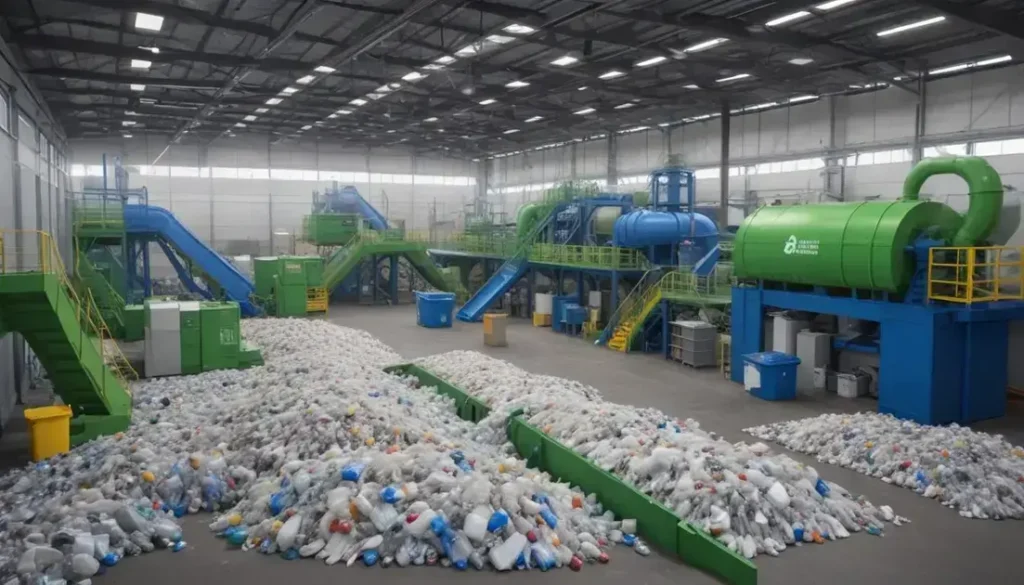Sustainability for Indian businesses involves adopting eco-friendly practices that reduce environmental impact, enhance brand reputation, and drive economic benefits through efficient resource management and collaboration with stakeholders.
The push for recycling is more pertinent than ever. As companies globally strive for sustainability, understanding new regulations is crucial. How can Indian businesses leverage these changes?
Introduction to Ingka Investments and its goals
Ingka Investments, a part of the Ingka Group, plays a pivotal role in supporting sustainability and responsible investment. This entity focuses on creating a circular economy by investing in projects that promote renewable energy and sustainable practices. The underlying goal is to ensure a greener future while generating long-term financial returns.
One of the primary aims of Ingka Investments is to back innovative solutions that align with a more sustainable way of living. By strategically investing in companies that prioritise environmental stewardship, Ingka is setting a benchmark for other firms in the sector. This forward-thinking approach underscores the importance of integrating sustainability into corporate strategy.
Ingka’s commitment extends beyond mere financial returns. The investments foster positive social change by creating job opportunities in green technologies and practices. As a result, Ingka positions itself as a leader in the transition towards sustainable business models.
Involvement in renewable energy projects not only supports climate goals but also enhances energy security. By investing in diverse energy systems, Ingka Investments aims to balance financial growth and environmental responsibility, thereby proving that profitability and sustainability can coexist harmoniously.
Overview of the global waste crisis
The global waste crisis represents a significant challenge facing our planet today. With increasing urbanisation and consumerism, waste generation has surged, leading to overflowing landfills and environmental degradation. In fact, an estimated 2.01 billion tonnes of waste is produced each year, and this number is projected to rise.
A major contributor to this crisis is single-use plastic, which takes hundreds of years to decompose. Approximately 300 million tonnes of plastic are produced annually, with a significant portion ending up in oceans and waterways, harming marine life and ecosystems. Effective waste management strategies are essential to combat this issue.
Moreover, developing countries often face severe waste disposal challenges due to lack of infrastructure. Many cities lack adequate facilities for the treatment and recycling of waste, exacerbating public health risks and environmental damage. This discrepancy highlights the urgent need for improved waste management solutions globally.
As governments, businesses, and individuals work together, innovative approaches like circular economy models can make a substantial impact. These frameworks encourage the reuse and recycling of materials, ultimately reducing waste output and fostering sustainability for future generations.
The significance of recycling in today’s economy
Recycling plays a crucial role in today’s economy, significantly influencing both environmental sustainability and resource management. By reprocessing materials, such as plastic, metals, and paper, we can reduce waste, conserve energy, and minimize greenhouse gas emissions. Implementing effective recycling systems not only helps in waste reduction but also creates economic opportunities.
The recycling industry contributes substantially to the economy by generating jobs and fostering innovation. According to recent studies, the sector supports millions of jobs worldwide and drives economic growth through the development of new technologies and processes. As businesses shift towards sustainable practices, investing in recycling initiatives becomes increasingly important.
Additionally, recycling conserves valuable natural resources. By utilizing recycled materials, industries can reduce their reliance on virgin resources, which are often limited and environmentally damaging to extract. This shift not only lowers production costs but also leads to a more sustainable supply chain.
Furthermore, consumer awareness about the benefits of recycling continues to rise. As individuals embrace sustainable lifestyles, the demand for recycled products grows, creating a vibrant market that emphasizes environmental responsibility. This trend encourages businesses to adopt circular economy principles, ensuring that materials are kept in use for as long as possible.
Insights on the new plastics recycling facility in Lommel
The new plastics recycling facility in Lommel represents a significant advance in recycling technology and sustainability efforts. This state-of-the-art facility is designed to process various types of plastics, transforming waste into valuable resources. By employing innovative methods, it aims to achieve a remarkable 90% recycling rate, setting a new benchmark in the industry.
This facility integrates advanced sorting and processing technologies, enabling the efficient separation of materials. These processes reduce contamination and enhance the quality of recycled products, making them more attractive to manufacturers. As a result, local businesses can benefit from high-quality recycled materials, promoting a more sustainable supply chain.
The establishment of the Lommel facility also addresses the pressing issue of plastic waste in the environment. With millions of tonnes of plastic ending up in landfills and oceans each year, this initiative aims to mitigate that impact by reducing plastic pollution through effective recycling practices. The facility also plays a vital role in raising community awareness about the importance of recycling.
Additionally, the Lommel project is expected to create numerous jobs, fostering economic growth in the region. By attracting investments and promoting green technology, this facility exemplifies the transition towards a circular economy, where resources are reused and recycled rather than discarded.
Benefits for Indian firms engaging in recycling
Engaging in recycling offers numerous benefits for Indian firms, particularly in the context of sustainability and economic growth. By adopting recycling practices, companies can significantly reduce their carbon footprint and contribute to environmental conservation. This not only enhances their corporate image but also resonates positively with eco-conscious consumers.
One of the primary advantages of recycling is the potential for cost savings. By reusing materials, firms can lower their production costs and reduce their dependency on raw material extraction. This shift not only enhances profitability but also ensures a more stable supply chain.
Moreover, companies that implement recycling initiatives often experience increased operational efficiency. Streamlined waste management processes lead to improved resource utilisation, reducing waste generation and enhancing overall productivity. Businesses can reposition themselves as leaders in sustainability, attracting partnerships and opportunities that align with green values.
In addition, the Indian government is increasingly incentivising recycling efforts, offering support and funding for businesses that adopt sustainable practices. This policy-driven approach not only benefits individual firms but also contributes to a broader circular economy, fostering innovation and creating jobs in the recycling sector.
As Indian firms embrace recycling, they play a crucial role in the transition towards a more sustainable economy. By being proactive, these companies can secure competitive advantages and ensure their long-term success in an ever-evolving market.
Green initiatives taken by Ingka Group
Ingka Group has made significant strides in implementing green initiatives aimed at fostering sustainability and reducing environmental impact. One of the key strategies involves transitioning to renewable energy sources. The group has committed to becoming climate positive by 2030, which includes investing in solar and wind energy projects globally.
The company has also initiated programmes to enhance energy efficiency across its operations. This includes retrofitting existing stores and facilities with energy-efficient appliances and systems that significantly reduce electricity consumption. By adopting innovative building technologies, Ingka strives to minimise its carbon emissions while enhancing the shopping experience.
Furthermore, Ingka Group actively promotes the use of sustainable materials in its products. The company has set ambitious goals to source all cotton, wood, and palm oil from more sustainable sources. This commitment not only supports forest conservation but also aids in protecting biodiversity.
In addition, Ingka encourages recycling and circularity among its customers by offering buy-back and recycling programmes. These initiatives aim to reduce waste by encouraging consumers to return used products for recycling, thus contributing to a circular economy.
Through these extensive green initiatives, Ingka Group exemplifies corporate responsibility, paving the way for a sustainable future while inspiring other companies to follow suit.
Impact of EU regulations on recycling industry
The impact of EU regulations on the recycling industry has been profound, driving significant changes in waste management practices across member states. The European Union has introduced a series of ambitious directives aimed at enhancing recycling rates and reducing landfill waste. These regulations require that by 2025, at least 55% of municipal waste is recycled, promoting a shift towards a more circular economy.
Such policies encourage industries to adopt better waste management strategies, leading to the development of advanced recycling technologies. Companies are now investing in innovative processes that improve material recovery and reduce contamination. This initiative not only helps businesses comply with regulations but also opens up new market opportunities for recycled materials.
Moreover, the EU’s focus on extended producer responsibility (EPR) places the onus on manufacturers to take back used products and ensure their proper recycling. This approach fosters accountability and encourages companies to design products that are easier to recycle, ultimately driving sustainability in product development.
Additionally, the regulations promote investment in recycling infrastructure, leading to job creation in the sector. As new facilities emerge to meet regulatory demands, skilled jobs become available, benefiting local economies and communities.
In summary, EU regulations are not just about compliance; they are shaping a sustainable future for the recycling industry, fostering innovation, and promoting environmental responsibility.
Job creation and economic benefits from recycling
The recycling industry plays a crucial role in job creation and economic development, contributing significantly to local and national economies. As recycling processes become more central to waste management, numerous jobs are generated across various sectors, ranging from sorting and processing to manufacturing.
In fact, for every job in waste management, approximately 1.17 additional jobs can be created in the recycling sector. This includes roles in operations, technical services, and logistics. Moreover, these jobs are often more sustainable compared to traditional waste disposal methods, as they focus on resource recovery and environmental preservation.
Furthermore, the economic benefits of recycling extend beyond job creation. Recycling facilities can contribute significantly to community revenues through local operations, creating a positive economic ripple effect. When companies invest in recycling infrastructure, they also stimulate demand for recycled materials, encouraging businesses to adopt sustainable practices and reduce reliance on virgin resources.
This shift not only supports job growth but also attracts investments in green technologies. As more firms engage in recycling activities, innovation in processes and materials occurs, further enhancing economic resilience. Local economies thus become more robust as they adapt to sustainable practices, drawing on the growing market for recycled products.
In summary, the interplay between recycling, job creation, and economic benefits highlights the importance of sustainable waste management for community prosperity and environmental health.
Long-term strategies for a circular economy
Long-term strategies for a circular economy focus on designing systems that prioritise sustainability, resource efficiency, and waste reduction. This involves a comprehensive approach that integrates the principles of reuse, repair, and recycling into product development and business models.
One key strategy is the redesign of products for longevity. By ensuring that items can be easily repaired and upgraded, companies reduce the frequency of disposal and encourage consumers to keep products longer. This not only minimises waste but also fosters a sense of ownership and responsibility towards the environment.
Another important aspect is establishing robust recycling systems that are accessible and efficient. Governments and businesses must invest in infrastructure that supports material recovery, enabling previously discarded products to be transformed into valuable raw materials for new products. This creates a closed-loop system that reduces reliance on virgin resources.
Collaboration between stakeholders is essential for achieving circular economy goals. Businesses, consumers, and governmental bodies must work together to create policies that encourage sustainable practices. Incentives, such as tax breaks for companies using recycled materials, can significantly drive this movement.
Education and awareness also play a critical role in transitioning towards a circular economy. By informing consumers about the benefits of sustainable choices, we can foster a culture that values sustainability and engages everyone in making responsible decisions.
Call to action for Indian businesses on sustainability
As environmental challenges escalate, Indian businesses must recognise their pivotal role in promoting sustainability. Adopting sustainable practices is no longer just an option; it is a necessity for long-term viability and success. Emphasising sustainability can lead to reduced operational costs, improved brand reputation, and increased consumer loyalty. Indian firms are encouraged to integrate sustainability into their core strategies. This can be achieved by minimising waste, utilising energy-efficient technologies, and sourcing materials responsibly. By implementing these practices, companies not only enhance their competitive edge but also contribute to the broader goal of environmental protection. Moreover, collaboration is key. Businesses should engage with stakeholders, including suppliers and consumers, to foster a culture of sustainability. Educational initiatives can inform employees about sustainable practices, empowering them to become advocates for change within the organisation. The government offers various incentives for businesses adopting green technologies, making it imperative for companies to explore available resources. Leveraging these supports can facilitate the transition towards sustainable operations and unlock new growth opportunities. Ultimately, a strong commitment to sustainability will not only benefit Indian businesses but also help in addressing global environmental issues. The time for action is now; by prioritising sustainability, Indian firms can lead the charge for a greener future.
In Conclusion: Embracing Sustainability for a Greener Future
As we face increasing environmental challenges, it is essential for Indian businesses to embrace sustainable practices. By adopting eco-friendly strategies, companies can not only reduce their impact on the planet but also enjoy significant economic benefits.
From improving efficiency to enhancing brand reputation, the advantages of sustainability are clear. Collaboration among businesses, consumers, and the government is vital for driving meaningful change.
Moreover, with available support and resources, integrating sustainability into business operations is more achievable than ever. It is an opportunity for Indian firms to take a leadership role in the global shift towards a greener economy.
Ultimately, the commitment to sustainability is a shared responsibility. By prioritising sustainable practices today, we ensure a healthier planet for future generations.
Frequently Asked Questions
Why is sustainability important for Indian businesses?
Sustainability helps Indian businesses reduce their environmental impact, improve efficiency, and enhance their brand reputation, making them more competitive in the market.
What practices can businesses adopt to become more sustainable?
Businesses can adopt practices such as reducing waste, using energy-efficient technologies, sourcing materials responsibly, and promoting recycling.
How can collaboration benefit sustainability efforts?
Collaboration with stakeholders, including suppliers and consumers, can foster a culture of sustainability, drive innovation, and enhance the effectiveness of sustainable practices.
What government resources are available for firms focusing on sustainability?
The government provides various incentives, grants, and support programs for businesses that implement green technologies and practices to encourage sustainability.
How can businesses measure the success of their sustainability initiatives?
Firms can measure the success of their sustainability initiatives by tracking key performance indicators, such as waste reduction, energy savings, and the percentage of recycled materials used.
What role does consumer awareness play in promoting sustainability?
Consumer awareness is crucial as informed consumers tend to support businesses that prioritise sustainability, driving demand for eco-friendly products and encouraging companies to adopt sustainable practices.


